 As has been widely anticipated, Intergovernmental Panel on Climate Change (IPCC) report, Climate Change 2013: the Physical Science Basis – published on 27 September – has concluded that human influence on the climate system is clear. This is evident, says the report, in most regions of the globe.
As has been widely anticipated, Intergovernmental Panel on Climate Change (IPCC) report, Climate Change 2013: the Physical Science Basis – published on 27 September – has concluded that human influence on the climate system is clear. This is evident, says the report, in most regions of the globe.
The report says it is “extremely likely” that human influence has been the dominant cause of the observed warming since the mid-20th century. The evidence for this has grown, thanks to more and better observations, an improved understanding of the climate system response and improved climate models.
The Summary for Policymakers states that: “Warming in the climate system is unequivocal and since 1950 many changes have been observed throughout the climate system that are unprecedented over decades to millennia. Each of the last three decades has been successively warmer at the Earth’s surface than any preceding decade since 1850.”
The co-chair of the Working Group that produced the report, Qin Dahe, commented: “Observations of changes in the climate system are based on multiple lines of independent evidence. Our assessment of the science finds that the atmosphere and ocean have warmed, the amount of snow and ice has diminished, the global mean sea level has risen and the concentrations of greenhouse gases have increased.”
Thomas Stocker, the other co-chair, added: “Continued emissions of greenhouse gases will cause further warming and changes in all components of the climate system. Limiting climate change will require substantial and sustained reductions of greenhouse gas emissions.
“Global surface temperature change for the end of the 21st century is projected to be likely to exceed 1.5°C relative to 1850 to 1900 in all but the lowest scenario considered, and likely to exceed 2°C for the two high scenarios. Heat waves are very likely to occur more frequently and last longer. As the Earth warms, we expect to see currently wet regions receiving more rainfall, and dry regions receiving less, although there will be exceptions.”
Projections of climate change are based on a new set of four scenarios of future greenhouse gas concentrations and aerosols, spanning a wide range of possible futures. The Working Group I report assessed global and regional-scale climate change for the early, mid, and later 21st century.
Thomas Stocker concluded: “As a result of our past, present and expected future emissions of CO2, we are committed to climate change and effects will persist for many centuries even if emissions of CO2 stop.”
Rajendra Pachauri, chair of the IPCC, said: “This Working Group I Summary for Policymakers provides important insights into the scientific basis of climate change. It provides a firm foundation for considerations of the impacts of climate change on human and natural systems and ways to meet the challenge of climate change.”
Those issues are to be assessed in the contributions of Working Group II and Working Group III, to be released in March and April next year. The IPCC Fifth Assessment Report cycle concludes with the publication of its Synthesis Report in October next year.